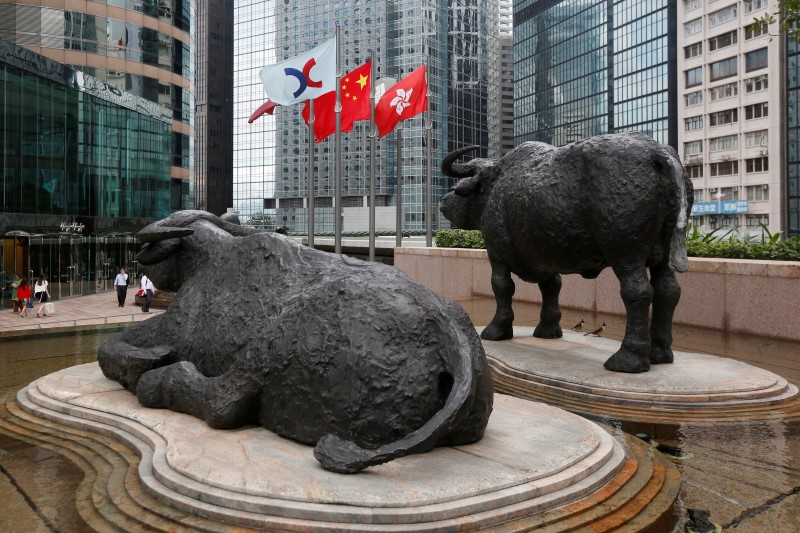This post was originally published on this site
https://i-invdn-com.investing.com/news/LYNXNPEC5E1KQ_M.jpg
Regional stocks saw some relief on Friday as U.S. Treasury yields somewhat stalled in overnight trade, after racing to multi-year peaks earlier this week. Wall Street indexes closed higher on Thursday after a series of losses, offering some positive cues to Asian markets.
Holidays in China and South Korea kept trading volumes muted on Friday.
Focus was now on key U.S. personal consumption data– the Federal Reserve’s preferred inflation gauge- after hawkish signals from the central bank battered markets over the past week.
Hong Kong’s Hang Seng was the biggest benefactor of bargain hunting, rallying 2.1% as it rebounded from a 10-month low.
Heavyweight technology stocks were among the key drivers of the rebound, with Baidu Inc (NASDAQ:BIDU) (HK:9888), Alibaba Group Holding Ltd (HK:9988) (NYSE:BABA) and Tencent Holdings Ltd (HK:0700)- the big three tech stocks of China- up between 1.7% and 3%.
Investors piled into heavily discounted Chinese stocks in hopes that the economy will receive a much-needed boost from the week-long mid-Autumn festival holiday, which begins today.
Hotel and department store operator New World Development Co Ltd (HK:0017) jumped 4% in Hong Kong trade, while videogame developer NetEase Inc (HK:9999) surged 4.8%.
Growing concerns over slowing Chinese growth and a property market crash drove steep losses in the Hang Seng over the past month. The index was trading down 3.5% for September.
Broader Asian markets were largely muted, but were mostly headed for steep losses in September. Hawkish signals from the Federal Reserve, a spike in oil prices and a sharp sell-off in the global bond market rattled sentiment towards risk-driven markets.
Worsening sentiment towards China also rattled local stocks, as fears of a property market crash surged after embattled developer China Evergrande Group (HK:3333) suspended all planned debt issuances due to a government investigation.
China’s Shanghai Shenzhen CSI 300 and Shanghai Composite indexes, which did not trade on Friday, lost more than 1% each for September.
Australia’s ASX 200 rose 0.4% on Friday, but was down nearly 3.5% for September, hit chiefly by concerns over China.
Japan’s Nikkei 225 was flat on Friday, while the broader TOPIX fell 0.9%. Both indexes were down between 1.8% and 2.2% for September, as they retreated from over 30-year highs.
Data on Friday painted a mixed picture of the Japanese economy. Inflation in Tokyo grew less than expected in September, while unemployment unexpectedly rose in August.
But Japanese industrial production did not contract as expected in August, while retail sales grew more than expected.
India’s Nifty 50 and BSE Sensex 30 indexes were the few outperformers for September, and were set to add more than 1% each after clocking record highs earlier in the month. Nifty futures pointed to a slightly negative index for local stocks on Friday.

